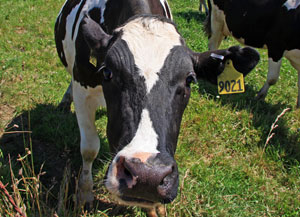Information About Livestock & Pet Movement
Do You Want to Bring Animals into California? Visit the CDFA Animal Health Entry Requirements interactive website to find the latest requirements needed to bring livestock and other animals into California.
Fact Sheets for California Entry Requirements
Livestock, Poultry and other Animal Entry Information
Most livestock and poultry have entry permit and Certificate of Veterinary Inspection (CVI) requirements to enter California (horses and other equidae do not require a permit but do require a CVI). California entry permits are issued to accredited licensed veterinarians from the state of origin by the Animal Health Branch by calling the Permit Line at (916) 900-5052. If a CVI is required for the shipment, it must be completely filled out prior to calling for the permit. The CVI must include the complete physical origin and destination address along with phone numbers. In certain circumstances, special movement documents may be allowed in lieu of a 30-day CVI and/or permit, such as Pasture-to-Pasture Permits. Please refer to CDFA’s Animal Disease Traceability webpage or call (916) 900-5052 for more information.
Current Disease Outbreak Movement Requirements
Livestock and Poultry Leaving California
For information on moving animals from California to other states, check the USDA Interstate Travel webpage and call the state of destination. The websites InterstateLivestock.com and AnimalRegs.com are other resources for veterinarians and livestock owners and contain information on entry requirements for states.
Category II accredited and California licensed veterinarians may order California Certificates of Veterinary Inspection (CVI) for Livestock and Poultry (Form 77-010) from the Animal Health Branch by calling (916) 900-5002 or emailing AHBFeedback@cdfa.ca.gov. Alternatively, veterinarians can utilize an electronic CVI service. Please refer to our page on Electronic CVIs (eCVIs) for information on CVI options for small animals and large animals and links to eCVI providers. Keep in mind that many states are only accepting eCVIs for imported animals. Confirm accepted forms with the destination state prior to shipment.
Effective January 1, 2020, CDFA will accept Global Vet Link's Extended Equine Certificate of Veterinary Inspection (EECVI) for equine interstate movement. Through the GVL software system, veterinarians can create an EECVI online, submit it to their state animal health official electronically, and provide owners with online access to retrieve the required travel permits for each interstate movement. For more information, visit Global Vet Link’s EECVI webpage.
Cervidae, Camelidae, Primates, and Exotic Animals
Restricted Species
Animals that are not regularly domesticated or that are potentially detrimental to California’s native wildlife are regulated by California’s Code of Regulations (CCR) Title 14, section 671 and administered by the California Department of Fish and Wildlife (CDFW). Anyone importing species that are restricted under this law should contact CDFW's License and Revenue Branch at (916) 928-5805, (916) 902-9107, or LRB@wildlife.gov. Permits are not issued to import or possess any wild animal for pet purposes.
Restricted species may include, but are not limited to, the following animals (contact CDFW’s Licensing and Revenue Branch to confirm a species is restricted):
- Amphibians
- Crustaceans
- Ferrets
- Fish
- Mammals not regulated by CDFA Animal Health Branch (check the Restricted Species List)
- Reptiles
- Rodents
- Wild Birds
Artiodactyla
Artiodactyla (even-toed animals), including cervids (deer, elk, moose, caribou, and exotic species), some camelids (vicuñas), and peccaries among others, have additional CDFW requirements before they can enter California including:
- Official identification
- A Certificate of Veterinary Inspection
- Testing for bovine tuberculosis
- Testing for brucellosis
Primates, New World Cats (Ocelots, Jaguar, Margay, Spotted Cat, Pampas), Ring-Tailed Cat, Foxes (Arctic, Red, Kit, Gray), Skunks & Bats
Contact the California Department of Public Health Veterinary Public Health Section at (916) 552-9740 for more information.
Biologics and Microorganisms
If transporting biologics, microorganisms, or parasites into California, contact the California Animal Blood Bank Program at CDFAbloodbanks@cdfa.ca.gov.
Small Animals Entering California
Effective January 1, 2025, per SB 312, CVIs are required to be submitted to CDFA for all dogs imported into California for the purpose of sale, resale, adoption, or any other change of ownership. The CVI must be issued by a licensed and accredited veterinarian and submitted electronically to both CDFA and the buyer within 10 days prior to entry into the state. CVIs can be submitted to CDFA via email at smallanimalcvi@cdfa.ca.gov. For more information about this change, visit our webpage - Submitting CVIs for Dogs.
CDFA does not have any additional import requirements for cats or dogs not changing ownership. For questions related to rabies vaccination and these species, contact the California Department of Public Health.
If importing small animals internationally, you must contact both the Centers for Disease Control (CDC) and U.S. Department of Agriculture (USDA) as they may have requirements and/or restrictions based on the country you're originating from.
Small Animals Leaving California
Requirements are determined by the destination state or country. If a CVI/health certificate is required for domestic travel, various forms are available for use by your veterinarian.
If exporting small animals internationally, you must contact the USDA to determine the destination country’s requirements. Additionally, USDA APHIS VS area office endorsement of your travel documents may be required.
Important Links
Resources
Follow Us
Contact Us
CDFA Animal Health and Food Safety Services,
Animal Health Branch
Sacramento, California 95814
Phone: 916-900-5002
Fax: 916-900-5333
Email: ahbfeedback@cdfa.ca.gov

